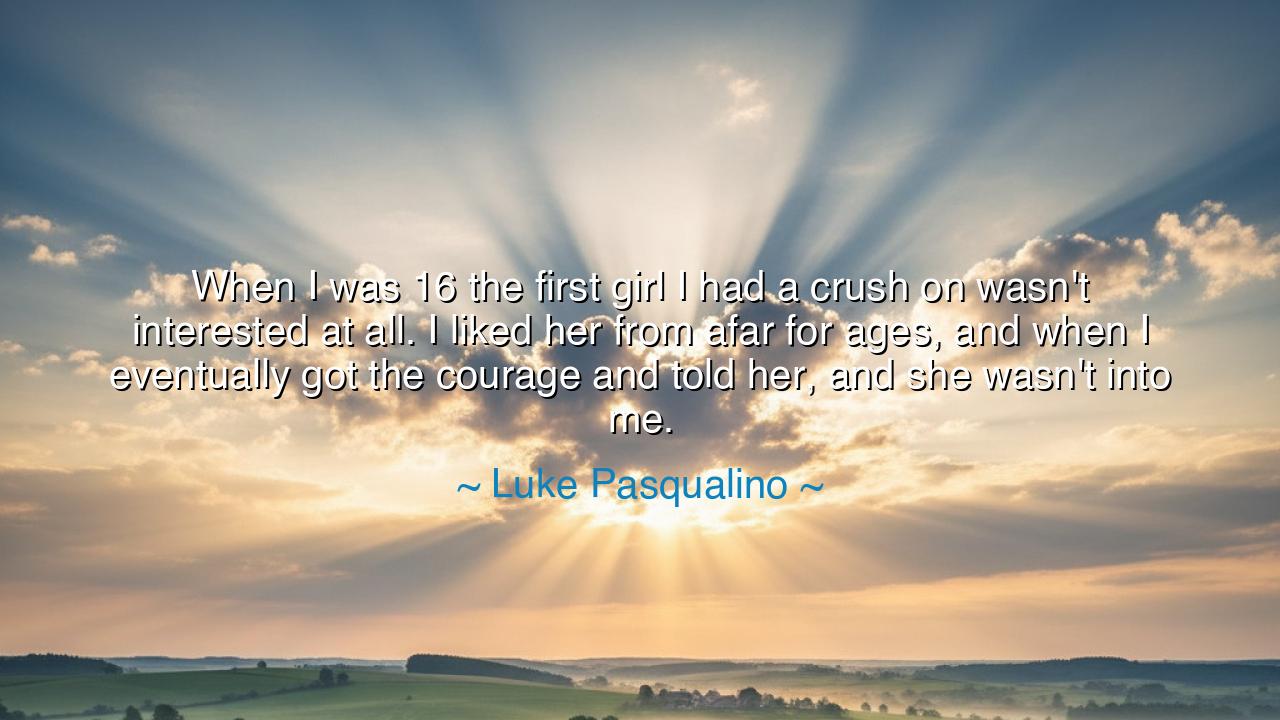
When I was 16 the first girl I had a crush on wasn't interested
When I was 16 the first girl I had a crush on wasn't interested at all. I liked her from afar for ages, and when I eventually got the courage and told her, and she wasn't into me.






Luke Pasqualino, speaking with the honesty of one who remembers his youth, once said: “When I was 16 the first girl I had a crush on wasn’t interested at all. I liked her from afar for ages, and when I eventually got the courage and told her, and she wasn’t into me.” Though simple in form, these words carry within them the ancient ache of human experience — the pain of unreturned affection, the courage to be vulnerable, and the wisdom that is born only through disappointment. What appears at first as a story of youthful heartache is, in truth, a timeless meditation on the nature of love, rejection, and self-discovery.
In the innocence of youth, when the heart first awakens to longing, every emotion burns brighter and deeper. The first crush is no small thing — it feels as vast as destiny, as sacred as poetry. When Pasqualino speaks of “liking her from afar for ages,” he evokes that universal human ritual: the silent waiting, the secret dreams, the countless what-ifs whispered only to oneself. Yet, behind those words lies the fear of rejection, a fear that often imprisons the heart. To “eventually get the courage and tell her” is no small act; it is a triumph of bravery, the moment when one dares to step beyond illusion and speak truth. And though the answer was not what he hoped for, his story is not one of failure — it is one of growth.
For the ancients, courage was not the absence of fear, but the mastery of it. In love as in battle, to reveal one’s heart is to risk defeat. Yet, as Pasqualino’s tale shows, there is honor even in rejection. For he who confesses his love has already won a victory — over his hesitation, over his pride, over the timid voice that says, “Stay silent.” When the girl turned away, he lost her affection, perhaps, but he gained something rarer: self-knowledge. He learned that love cannot be commanded, and that one’s worth is not measured by another’s desire. To love courageously and accept rejection with grace — that is the beginning of wisdom.
History, too, is filled with such lessons. Consider Dante Alighieri, who loved Beatrice from afar and was never loved in return. Yet that unreturned affection did not destroy him; it transformed him. From that silent sorrow came The Divine Comedy, one of the greatest works of human imagination. Dante’s pain became his awakening, his unfulfilled love a bridge to the eternal. So it is with Pasqualino’s story — what begins as a wound becomes a teacher. Rejection, when borne with humility, refines the soul, turning naïve desire into mature compassion. It teaches us that love, even unreturned, still ennobles the heart that feels it.
There is also something deeply noble in the idea of loving “from afar.” In the ancient world, the poets called this platonic affection, the love that admires without possession, that sees beauty and is inspired by it rather than consumed by it. Such love purifies rather than corrupts. It reminds us that to love is not always to win, and that true affection is measured not by what it gains, but by what it gives. The courage to feel deeply — even without reward — is the mark of a soul still open to life’s mystery.
And yet, Pasqualino’s story also reveals a turning point — the moment when illusion gives way to truth. The young heart learns that not every feeling will be mirrored, not every dream fulfilled. But in this breaking, the heart becomes wiser, more resilient, and more capable of genuine love. For love, if it is to be real, must be free — free to begin, and free to end. To accept rejection without bitterness is to honor the freedom of the other, and in doing so, one becomes stronger, gentler, and more complete.
So, my child of the heart, learn from this humble tale. Do not fear rejection, for it is not the enemy of love, but its purifier. To love and to speak that love — even when the answer is “no” — is an act of courage that shapes the soul. Do not let the silence of another heart silence your own. Feel deeply, speak bravely, and accept the outcome with grace. Every unreturned love teaches you more about who you are, and prepares you for the love that will one day return your gaze. For in the end, as Luke Pasqualino’s story quietly shows, it is not the love we receive that defines us — but the courage to love at all, and to keep our hearts open even after they have been broken.






AAdministratorAdministrator
Welcome, honored guests. Please leave a comment, we will respond soon